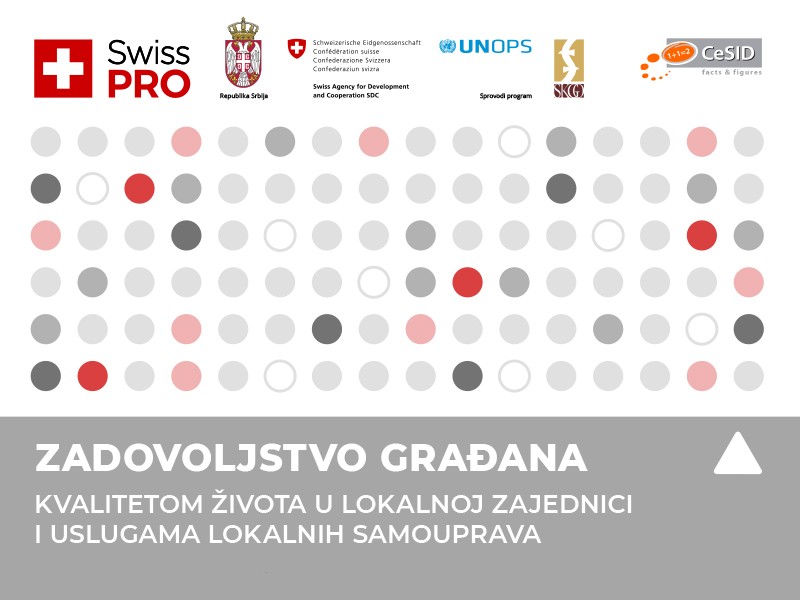News / Actualities
Citizens’ Satisfaction with Local Self-Governments Increased
-
Belgrade, 15 October 2019
The survey was implemented by CeSID, on a representative sample of 11,387 adult citizens in 50 towns and municipalities in the Region of Šumadija and West Serbia and the Region of South and East Serbia. After the 2010 results with only 22 percent of respondents feeling that local authorities were taking care of their citizens, a rising trend has been recorded, with 26 percent in 2013, 37 percent in 2017 and the last survey results show that 45 percent of respondents feel positively about the treatment of citizens by the local self-government. Even though the perception that local self-governments are trying to meet their citizens’ needs is enhancing, still one-third of respondents feel that local authorities mostly do not respond to their citizens’ needs, and 12 percent feel that they do not respond to them at all.
However, one in three respondents feels that they do not have enough information about the functioning of the municipality they live in. Only one to two percent of respondents have actively participated in decision-making processes at the local level, such as referenda, public hearings and similar. One in ten citizens have heard of such activities but have not participated in them, and over 85 percent of respondents have not even heard of something like that happening in their municipality.
To the question on what functions best within the municipal administration, over one-half of citizens mentioned the general administration, in charge of issuing certificates based on citizens’ registries, other certificates, proofs and similar documents. One-fifth of respondents felt that tax affairs functioned the best, followed by social affairs, such as social protection, education and healthcare. Only five percent of respondents evaluated construction and urban planning, as well as inspection affairs, the highest.
One in four citizens feels there are certain improvements in the performance of administrative authorities at the local level compared to last year. Almost one in two feel they are performing the same as during the previous period and only six percent of respondents feel that local administration’s performance has deteriorated compared to the past, which is far fewer than in previous survey cycles.
The highest progress in the performance of municipal services is perceived in relation to time savings, followed by increased quality of services, and somewhat fewer respondents feel there have been improvements in money savings required for dealings with the local self-government. Around two-fifths of citizens feel that everything is at the same level, and only five percent of respondents feel that the situation related to the above-mentioned areas has deteriorated. The citizens that have recently contacted their local self-government evaluate its performance better than those that have not had direct experiences.
While 90 percent of citizens claim they have never given a bribe in cash or a gift to a civil servant, one in ten respondents admit to petty corruption, gifts of coffee, sweets or liquor to a local administration service, and under one percent of respondents report using cash to bribe a civil servant.
For years, the majority of Central Serbia citizens have felt that the development of local self-governments should be based on agriculture, followed by light industry. The priority field for investment in the local community for citizens is to improve the opportunities for youth, and data indicate that there are three times more citizens who would like to see investments in the increase of the quality of health institutions than schools or kindergartens.
Among local institutions, citizens demonstrate the highest level of trust in the Mayor, followed by the Municipal Administration and civil servants. They trust local media slightly more than websites, and they trust political parties and civil society organisations equally.
The citizens’ feeling of safety is at a high level, with nearly 80 percent of respondents feeling completely or partially safe in their town or municipality of residence. On the other hand, somewhat over one-fifth of citizens feel unsafe, and the reasons they give are poor infrastructure, such as unlit streets, unsafe roads and potholes on driveways, as well as crime, followed by stray dogs, poor interpersonal relations and drug use.
Thirteen percent of citizens in Central Serbia feel they live well, two-thirds describe their current quality of life as “mediocre” or “tolerable”, with another 3% of respondents feeling their lives are “intolerable”. Trends in comparison with previous survey cycles implemented in 2010, 2013 and 2017 indicate a gradual increase in the percentage of citizens satisfied with the elements of daily life in the local community. Citizens’ satisfaction is the highest when it comes to the availability of places for shopping and purchase, the situation at green markets and the quality of educational institutions. On the other hand, the highest percentage of dissatisfaction was expressed regarding youth policy, equal access to rights, cleanliness and availability of parking spaces in towns.
A detailed analysis of the results is available on the Swiss PRO website.
Presentations of citizens’ views will be held in Kraljevo (16 October), Kragujevac (17 October), Leskovac (21 October), Niš (22 October) and Smederevo (23 October). These events will be open to the public and will include presentations on trends in the districts of the above-mentioned towns.
The following local self-governments were included in the survey: Arilje, Babušnica, Bajina Bašta, Bela Palanka, Bogatić, Bojnik, Boljevac, Bor, Bosilegrad, Bujanovac, Doljevac, Gornji Milanovac, Jagodina, Knić, Knjaževac, Kragujevac, Kraljevo, Lapovo, Lebane, Leskovac, Loznica, Mali Zvornik, Malo Crniće, Mionica, Niš, Nova Varoš, Novi Pazar, Petrovac na Mlavi, Pirot, Priboj, Rača, Raška, Ražanj, Sjenica, Smederevo, Sokobanja, Svilajnac, Šabac, Topola, Trgovište, Trstenik, Ub, Užice, Velika Plana, Veliko Gradište, Vladičin Han, Vlasotince, Vranje, Vrnjačka Banja i Zaječar.






